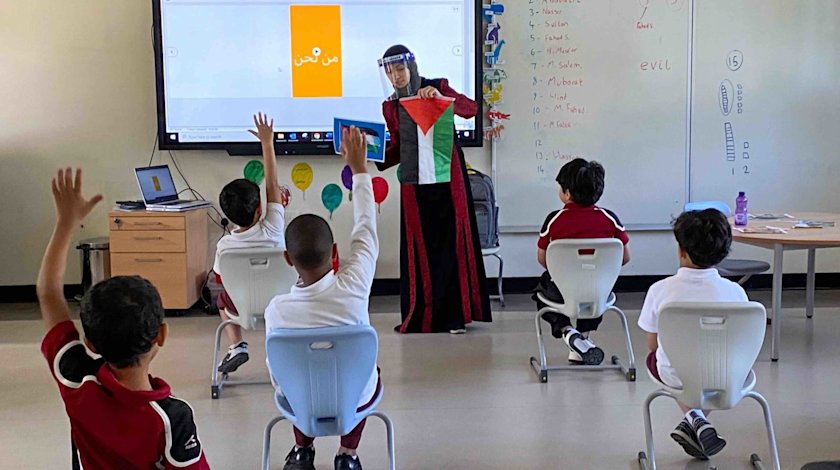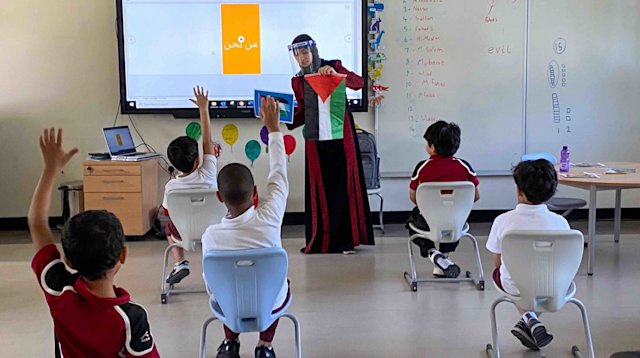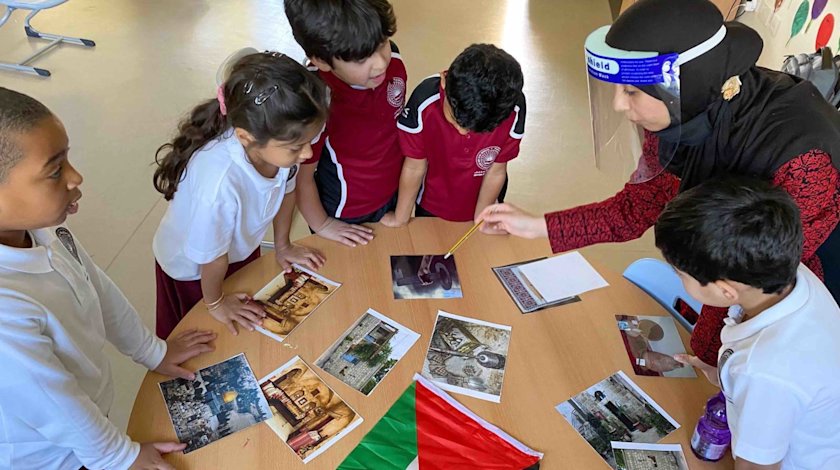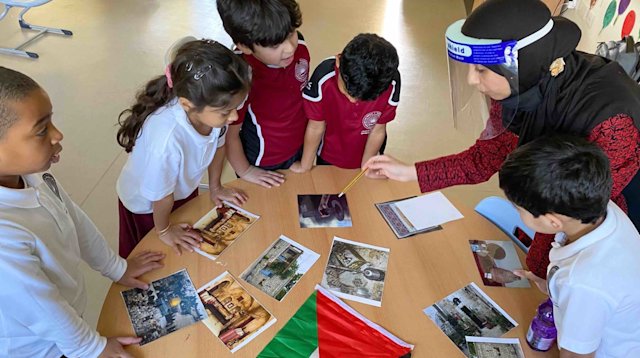Coronavirus (COVID-19) Updates
For the latest COVID-19 information and updates from Qatar Foundation, please visit our Statements page

A teacher at Tariq Bin Ziyad School shares her experiences and insights to build awareness of justice and righteousness among her class of little school-goers
After the unfolding of the recent events in Gaza and the Sheikh Jarrah neighborhood in Palestine where the Israeli government attempted, and continues to forcibly displace Palestinian families, a five-year-old student asked his teacher, “Is your country okay?”
Since the beginning of her teaching career that started in the heart of Gaza, Hanan Seyam, a kindergarten Arabic language teacher at Tariq Bin Ziyad School – a school under Qatar Foundation’s Pre-University Education – made a promise to her herself. She would carry the lofty message of spreading awareness about the history of the Palestinian cause, especially among the new generation.
Seyam believes educating children from an early age with the understanding that – no matter how long it takes, the truth shall always prevail and justice must see the light of day – contributes immensely in forming an awareness about the world around them. She believes that this will help in raising a responsible generation who are able to differentiate between right and wrong, and one that’s aware of their rights and responsibilities.


After spending years teaching Arabic to students of all ages, and her passion for teaching students about Palestine as an Arab cause, Seyam continued her career by joining Tariq Bin Ziyad School, where she found herself in a challenging and yet exciting environment as she had to teach the Palestinian cause, as part of the school’s curriculum, to little kindergarten children.
It’s like planting a seed that gradually grows and is nurtured by their curiosity to learn more about Palestine and its history
“The idea of teaching kindergarten children about the Palestinian struggle against the Israeli occupation emerged from our awareness as teachers, and because we want our students to understand and have knowledge about what is happening around them.
“Their information must not be limited to what they watch or hear on social media and on the news, especially with regard to an ongoing conflict that concerns not only the Arab region but the entire world, and which is repeatedly raised in debates and discussions that children listen to in their environment, whether at home, school or on television.” Seyam explained.
The school management and its teachers believe in the importance of connecting children with what is happening around them, and thus the Palestinian cause was included within the topics of a unit of inquiry titled "Share the Planet”.


TBZ early years students looking at images of Al Aqsa mosque and items from Palestinian culture.
“From here, questions begin in their minds that turn into discussions. It’s like planting a seed that gradually grows and is nurtured by their curiosity to learn more about Palestine and its history,” said Seyam.
Children spontaneously apply these concepts through simple situations that occur with them daily, such as my right to play, my right not to be attacked, or my right to express my opinions
The students at Tariq Bin Ziyad School have been invested in the Palestinian cause since the recent events. With the help of their teachers, the students sent Eid greeting cards to Palestinian children and children in Gaza, and shared videos that expressed support for Palestine and Al-Aqsa Mosque through the school’s Siso platform for remote learning.
On a personal level, Seyam expresses the culture of her country in every way she can, whether by speaking the Palestinian dialect, wearing traditional Palestinian clothes, as well as picking stories and songs appropriate for the students. All of this plays a major role in introducing children to the culture of Palestine.
I was surprised by the question of a young student in my class after I returned from the Eid holidays. The question was about the conditions of my country after the recent events
She believes that children are endowed with innate intelligence, as children can comprehend the concept of justice and what it means to be right and wrong, especially when this concept is presented in a way that is appropriate to their age.
“Children spontaneously apply these concepts through simple situations that occur with them daily, such as my right to play, my right not to be attacked, or my right to express my opinions, and then the child learns how to defend his or her rights and adhere to their principles, which plays a huge role in building the personality of a student who can tell right from wrong and recognizes the rights of others,” Seyam explained.
I was touched by his awareness about what’s happening in Palestine, which reaffirms my belief of what we do as teachers and educators, and its impact on young children and their awareness
On the other hand, as a mother of five children – all of whom witnessed war first-hand in Gaza – and as a teacher with long experience in teaching this issue, Seyam believes that children are able to empathize and link events to each other.
“I was surprised by the question of a young student in my class after I returned from the Eid holidays. The question was about the conditions of my country after the recent events. I was touched by his awareness about what’s happening in Palestine, which reaffirms my belief of what we do as teachers and educators, and its impact on young children and their awareness, especially given their massive exposure to digital media.
“The feelings children share express what’s going on in their minds. I remember the picture of the child Ahed Al-Tamimi that became popular, and inspired children around the world – they sympathized with her and followed her story passionately, as she became an icon of the Palestinian child’s battle against Israeli occupation. A children’s book was also written on her,” Seyam said.
Seyam emphasized as well on the importance of selecting content that is away from violence, such as images of killing and destruction that occur in Gaza, because they negatively affect the psyche of children. She has experienced this first-hand with her own young children during the wars in Gaza, and since, has always tried to distance them from images of violence.
“The teacher who talks about Palestine – making her students question everything they see around them and discuss Palestine issues – will remain my most cherished role I have played in my teaching career,” Seyam said.

